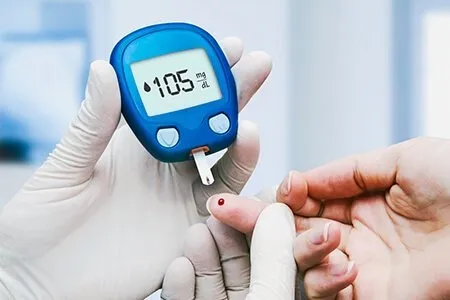Diabetes: A Comprehensive Overview of a Metabolic Disorder...!!!
Diabetes is a complex and multifaceted condition that demands diligent management to prevent complications and improve quality of life. Advances in medical research and technology continue to enhance our understanding of diabetes and offer new avenues for treatment and prevention.

Diabetes mellitus, often simply called diabetes, is a chronic metabolic disorder that hampers the body's ability to process blood glucose, also known as blood sugar. There are three main types of diabetes: Type 1, Type 2, and gestational diabetes, each with its own characteristics and underlying mechanisms.
Type 1 Diabetes
Previously referred to as juvenile diabetes, Type 1 diabetes is an autoimmune condition where the body's immune system attacks and destroys the insulin-producing beta cells in the pancreas. This leads to little or no insulin production. Insulin is a hormone that enables glucose to enter cells and be used for energy. Without enough insulin, glucose accumulates in the bloodstream, causing high blood sugar levels.
The symptoms of Type 1 diabetes often appear suddenly and can include frequent urination, excessive thirst, extreme hunger, unintended weight loss, fatigue, and blurred vision. Managing Type 1 diabetes requires lifelong insulin therapy and careful monitoring of blood sugar levels.
Type 2 Diabetes
Accounting for about 90-95% of all diabetes cases, Type 2 diabetes is the most common form of the disease. Unlike Type 1, Type 2 diabetes is primarily characterized by insulin resistance, where the body's cells become less responsive to insulin. Over time, the pancreas cannot produce enough insulin to overcome this resistance, resulting in high blood sugar levels.
Risk factors for Type 2 diabetes include obesity, physical inactivity, poor diet, age, genetics, and certain ethnic backgrounds. The symptoms of Type 2 diabetes develop gradually and may include increased thirst, frequent urination, hunger, fatigue, blurred vision, and slow-healing sores or frequent infections.
Gestational Diabetes
Gestational diabetes occurs during pregnancy when the body cannot produce enough insulin to meet the increased needs of the mother and developing fetus. Although it usually resolves after childbirth, gestational diabetes raises the risk of developing Type 2 diabetes later in life for both the mother and child.
Risk factors for gestational diabetes include a history of gestational diabetes in previous pregnancies, obesity, advanced maternal age, and a family history of diabetes. Managing gestational diabetes involves dietary changes, regular physical activity, blood sugar monitoring, and, if necessary, insulin therapy.

Complications
Diabetes can lead to a variety of serious complications if not properly managed. These complications can affect various organs and systems in the body, including:
-
Cardiovascular Disease: People with diabetes have a higher risk of developing heart disease, stroke, and hypertension due to damage to blood vessels and nerves.
-
Neuropathy: Diabetic neuropathy is a type of nerve damage that can cause pain, tingling, and loss of sensation, particularly in the extremities.
-
Nephropathy: Diabetes can damage the kidneys' filtering units, leading to diabetic nephropathy, which may progress to kidney failure.
-
Retinopathy: High blood sugar levels can damage the blood vessels in the retina, leading to diabetic retinopathy, which can cause vision loss and blindness.
-
Foot Complications: Diabetes can lead to poor blood flow and nerve damage in the feet, increasing the risk of infections, ulcers, and amputations.
Management and Treatment
Managing diabetes requires a multifaceted approach to keep blood sugar levels within a target range. Key components of diabetes management include:
-
Healthy Eating: A balanced diet rich in whole grains, fruits, vegetables, lean proteins, and healthy fats helps regulate blood sugar levels. Limiting sugary foods and refined carbohydrates is essential.
-
Physical Activity: Regular exercise improves insulin sensitivity and helps control blood sugar levels. Aiming for at least 150 minutes of moderate-intensity aerobic activity per week is recommended.
-
Medication: Depending on the type and severity of diabetes, medications such as insulin, metformin, and other oral or injectable drugs may be prescribed to manage blood sugar levels.
-
Blood Sugar Monitoring: Regular monitoring of blood sugar levels is crucial for adjusting treatment plans and preventing complications. Self-monitoring devices and continuous glucose monitors can assist with this.
-
Education and Support: Diabetes education programs and support groups provide valuable information and emotional support to help individuals manage their condition effectively.
Prevention
While Type 1 diabetes cannot be prevented, Type 2 diabetes and gestational diabetes can be mitigated through lifestyle changes. Maintaining a healthy weight, engaging in regular physical activity, and adopting a balanced diet are key preventive measures. Early detection and intervention are also critical in preventing the progression of prediabetes to Type 2 diabetes.
In conclusion, diabetes is a complex and multifaceted condition that demands diligent management to prevent complications and improve quality of life. Advances in medical research and technology continue to enhance our understanding of diabetes and offer new avenues for treatment and prevention.
What's Your Reaction?

















